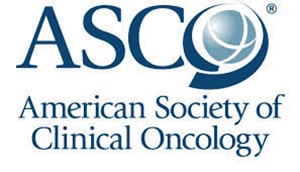
Part II
This week we continue our reporting of interesting or important studies from this year’s meeting of the American Society of Clinical Oncology in Chicago in June. At this meeting the most important advances of the year are presented; these studies will impact how cancer is treated going forward. Of course, you are getting my biases in what I consider interesting. Herewith some additional key studies:
- Metastasectomy, surgical resection of metastases, has been a reasonably effective treatment for colorectal cancer patients with a limited number of resectable liver metastases. But surgery has not been an option for those with extensive metastases. A randomized trial from France, the TRANSMET study, presented by Rene Adam of Paul Brousse Hospital in Villejuif, France, tested the efficacy of liver transplantation combined with chemotherapy versus chemotherapy alone for such patients. Eligible patients had unresectable BRAF wild-type colorectal liver metastases, with response to chemotherapy for <3 months, had received less than three lines of chemotherapy, and had disease only in the liver. Between February 2016 and July 2021, 47 patients were randomized to liver transplantation plus chemotherapy versus 47 patients to chemotherapy alone. Nine patients did not receive transplantation because of tumor progression during the delay while waiting for a transplant. The five-year overall survival was 57% in the liver transplant arm versus 13% in the chemotherapy alone arm (HR 0.37, 95%CI 0.21-0.65). Among the patients undergoing transplant, 28 subsequently developed recurrences (lung, liver, other) while 15 patients (40%) remained disease-free.
- While resectable locally advanced esophageal adenocarcinoma (EAC) is now routinely treated with neoadjuvant (upfront) therapy and surgery, an open question is whether perioperative chemotherapy (before and after surgery) would be superior. This was addressed by the ESOPEC trial, a multi-center study in Germany, presented by Jens Hoeppner of the University of Bielefeld, Bielefeld, Germany. Between February 2016 and April 2020, the study randomized 438 patients from 25 sites in Germany with clinical T1N+ or T2-4aNX nonmetastatic resectable EAC to receive either perioperative FLOT (5FU/leucovorin/oxaliplatin/Taxotere) or neoadjuvant CROSS (41.4 cGy plus carboplatin/paclitaxel) followed by surgery. The rate of R0 resections was similar in both groups (no cancer cells seen microscopically at the tumor site after surgery). After a median follow-up of 55 months, the median overall survival for FLOT was 66 months and for CROSS it was 37 months. The three-year OS rates were 57.4% and 50.7%, respectively (HR 0.70, 95%CI 0.53-0.92).
- Timothy Hughes of the University of Adelaide, Adelaide, Australia, presented a randomized clinical trial conducted in multiple global centers that compared asciminib, a new tyrosine-kinase inhibitor (TKI), to investigator-selected older TKIs in newly diagnosed patients with chronic myeloid leukemia (CML). The median follow-up was approximately 16 months with 201 patients randomized to asciminib and 204 to other TKIs. The major molecular response (MMR) rate at 487 weeks was 67.7% for asciminib vs 49.0% for TKIs, p>0.001. Asciminib also had fewer serious (grade <3) adverse effects. Asciminib may become the new standard of care for CML.
- The German Hodgkin Study Group presented further follow-up of their randomized trial of advanced Hodgkin lymphoma patients. The results were presented by Peter Borchmann of the University Hospital of Cologne, Cologne, Germany. The study included 1,482 patients with advanced Hodgkin lymphoma who were randomized to dose intense regimens—either BrECADD (brentuximab vedotin, etoposide, cyclophosphamide, Adriamycin (doxorubicin), dacarbazine, dexamethasone) or BEACOPP (bleomycin, etoposide, Adriamycin (doxorubicin), cyclophosphamide, Oncovin (vincristine), procarbazine, prednisone). With a median follow-up of four years, the four-year PFS was 94.3% for BrECADD versus 90.9% for BEACOPP (HR 0.66, 95%CI 0.45-0.97). This confirmed the value of brentuximab vedotin in combination with chemotherapy in Hodgkin lymphoma, even as nivolumab combined with AVD chemotherapy presented at ASCO 2023 showed a better PFS, 94% at 12 months compared to brentuximab vedotin with AVD, 86% at 12 months.
- Human papillomavirus (HPV) is responsible for a variety of squamous cell malignancies in both men and women, including cervical cancer, cancers of the anogenital area (vulva, vagina, penis, anus), and HPV-related cancers of the head and neck. The development of an effective vaccine for these viruses has led to the recommendation of their administration in the U.S. at ages 11-12 to girls starting in 2006 and has had variable recommendations for males starting in 2010. Since these cancers primarily occur in middle and older age populations, one can only get an indication of the effectiveness of the vaccine at this point in time. DeKloe and colleagues from Thomas Jefferson University conducted a retrospective cohort study in the TriNetX United States Collaborative Network, a compilation of data from healthcare organizations for clinical trials and health outcomes research purposes. The investigators identified patients 9-39 years of age who underwent HPV vaccination at least five years earlier (male n=760,540; female n=945,999) and those with no HPV vaccination. They found that males had a reduced risk of head and neck cancer (odds ratio (OR) 0.44; 95% confidence interval 0.26-0.73). Females had a decreased risk of cervical cancer (0.71; 0.52-0.96) but did not have significantly decreased risks of head and neck or vulvar/vaginal cancer. These are very early signs of the vaccine’s effectiveness, but the numbers still remain small for certain of the malignancies.
Alfred I. Neugut, MD, PhD, is a medical oncologist and cancer epidemiologist at Columbia University Irving Medical Center/New York Presbyterian and Mailman School of Public Health in New York. Email: ain1@columbia.edu.
This article is for educational purposes only and is not intended to be a substitute for professional medical advice, diagnosis, or treatment, and does not constitute medical or other professional advice. Always seek the advice of your qualified health provider with any questions you may have regarding a medical condition or treatment.









